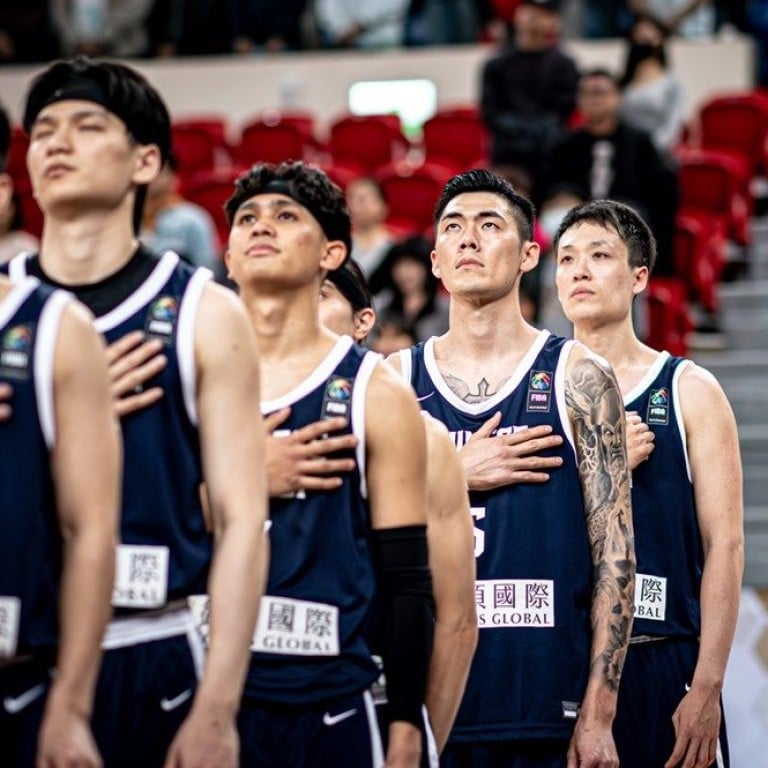
While Hong Kong drags its feet naturalising basketball players, Taiwan is busy recruiting foreign talent
- Taiwan officials say they are on course to have newly naturalised and localised players by the teams’ next match in November
- Hong Kong’s rules are less lenient, with players facing longer periods to earn the right to play for the city
Hong Kong risks watching their main rivals from Taiwan put together a much stronger team ahead of their FIBA Asia Cup qualifier in November.
Officials at the Chinese Taipei Basketball Association told the Post they were on course to bring in two naturalised players for the next window of the tournament, while Hong Kong’s efforts to bring in reinforcements appeared to be stagnant.
Sources with knowledge of the development told the Post they were working on the eligibility of Hong Kong Eastern forward Dominic Gilbert, an Australian-Croatian born in Hong Kong.
“Necessary papers had been submitted [to the Immigration Department] last October,” the source said. “So, we’re in the process.
“Gilbert has a Hong Kong Identity Card but he doesn’t have the Right of Abode [in the Hong Kong Special Administrative Region] yet, and that’s what we are working on.”

The city’s laws require both Chinese citizens and non-Chinese citizens to have lived in Hong Kong for a continuous period of not less than seven years to be eligible for the Right of Abode in the HKSAR.
Things are slightly more relaxed in Taiwan, with their Nationality Act requiring foreigners to have legally resided in the territory for more than 183 days each year for at least five consecutive years, among a few other requirements.
Two United States-born players, Quincy Davis and William Artino, have been naturalised through the form of “special honours”, while 25-year-old Mohammad Al Bachir Gadiaga of Senegal, who plays for T1 League outfit New Taipei CTBC DEA, has Fiba’s approval to play as a local player after he moved to the island with his parents at the age of eight.

Speaking to the Post, Lee Yun-hsiang, secretary general of the Taiwanese association, said he expected the naturalised and localised players to suit up for the team when they host Hong Kong on November 21.
“We always have plans to bring in naturalised players for the next window,” he said. “We’re also actively seeking other candidates.
“It remains the coach’s decision to field either Davis or Artino then, but I believe both of them, as is Gadiaga, will be ready.”
Naturalising players for national teams has been a trend in the region, as well as globally, especially in recent years.

China has Minnesota Timberwolves forward Kyle Anderson on deck; Josh Hawkinson and Josh Harrellson play for Japan; while Guna Ra has been playing for South Korea since 2018.
Local team officials believed national teams in the region with naturalised players generally see better results and have suggested the rules be relaxed.
“We’re talking about residing in Hong Kong for seven years, which is an extended period, let alone the costs involved,” Oliver Lee Shu-wing, executive manager of Hong Kong Eastern, said. “How many years do athletes have in their career?
“It’s an obvious trend for team sports in the region. If there can be more flexibility [in the rules], I believe it’s good for the sports development in Hong Kong.”
Chinese Taipei, who played with only local players in the first Fiba window, are bottom in Group B behind Hong Kong on points difference, after both teams lost their opening two games.
Chinese Taipei were blown apart by the Philippines in Pasig in a 53-point loss last Sunday, while Hong Kong lost 88-49 to New Zealand in Auckland.

 - Mike Chan.jpeg?itok=EQbwYm3R&v=1669714688)